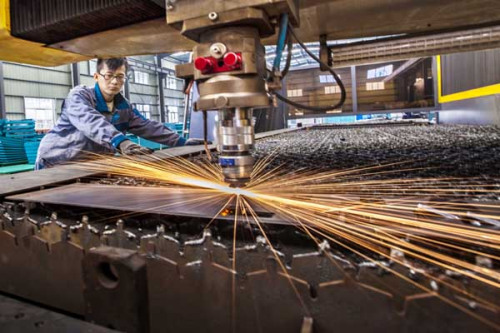
Elevator fittings being produced at a company in Lianyungang city, Jiangsu province. (Photo/Provided to China Daily)
China's leaders are taking action to support the shift to a more sustainable growth model. But not everyone is optimistic. Veteran China watcher David Shambaugh recently warned that the challenges facing the political system, led by the Communist Party of China, may be severely compromising the government's ability to implement the package of ambitious economic reforms announced in 2013.
Yet the claim that China's economic and political development is in jeopardy seems to ignore the country's adaptive learning process, which shapes every economic, diplomatic, military and social policy. This process — characterized by experimentation, assessment and adjustment — emerged from the CPC's military experience of the 1930s, was applied by Deng Xiaoping to his reform program in the 1980s, and has been refined by subsequent Chinese leaders. Because no economy had ever experienced such rapid growth on such a large scale, the only way to manage China's development is, as Deng put it, to "cross the river by feeling the stones".
China's adaptive policymaking approach has produced both spectacular failures, with entire markets being shut down, and remarkable success, yielding models that could be applied across the country. Some experiments have had less clear results, making, say, a positive contribution to GDP growth, but also contributing to problems like excess industrial capacity, pollution, corruption and the creation of ghost towns.
In a context of experimentation, such unintended consequences are understandable. The mere fact that they have emerged in no way suggests that China is headed for disaster; that would be the case only if these problems were allowed to persist.
To prevent such an outcome, China has to ensure its "new normal" goes beyond policies intended to sustain economic growth. Reforms must aim to bolster inclusiveness, advance environmental sustainability, promote innovation and boost competitiveness. And this is precisely the four-pronged approach that China's leaders seem to be taking.
Indeed, from slashing coal consumption to addressing air pollution to plans for integrating information technologies with modern manufacturing, China has shown time and again that it recognizes its reform imperatives. And by remaining dogged in its efforts to root out official graft, it has demonstrated its will to do what is needed to ensure success.
This is not to say smooth sailing lies ahead. The Chinese bureaucracy must adapt radically to cope with the risks — and take advantage of the benefits — of technology and globalization, with the biggest challenge being the shift to a knowledge-based, environmentally conscious, inclusive and stable industrial base. And the government must take steps to enable market forces to play a greater role in directing economic activities, including by reducing licensing and regulatory requirements for the private sector.
China is reforming its inefficient approval-based system of initial public offerings to one based on registrations. A more active and efficient IPO market will allow companies to meet their financing needs without bank intermediation — a step that is vital to helping companies eliminate their debt overhangs.
In fact, reducing the role of banks is essential to balancing China's economy. Despite the recent rebound, China's stock-market capitalization amounts to only 40 percent of GDP, while banking assets total 266 percent of GDP. And only 10 percent of total social funding comes from the equity market.
But there is one important component missing from the government's reform agenda for 2015: improved bankruptcy procedures for failed borrowers. Unless failed borrowers and projects exit the system quickly and smoothly, the market will be saddled with bad debt and incomplete projects, undermining its performance.
China has repeatedly proved its durability and adaptability. It must do so yet again, by ensuring that its "new normal" is as stable, sustainable, and inclusive as possible. This entails strengthening its institutional foundations and establishing clear, transparent rules in order to encourage experimentation and innovation, ensure the smooth exit of failed projects and manage the fallout of errors.
Failure may be the mother of success — but only if one makes the effort to learn from it. Fortunately, China's leaders seem intent on doing just that.
Author Andrew Sheng is a distinguished fellow of the Fung Global Institute and a member of the UNEP Advisory Council on Sustainable Finance, and author Xiao Geng is director of research at the Fung Global Institute.
















































